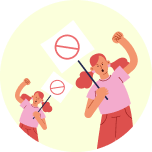Frequently Asked Questions Regarding Plagiarism

Plagiarism is one of the most discussed topics on the web in recent times. You will find thousands of videos and articles elaborating on this specific term. This signifies the cruciality of this topic. Therefore, it is also essential for you to learn about plagiarism, its types, and its effects, significantly if you are associated with academics or content writing.
Copying the ideas of others in your work without mentioning the source or author is called plagiarism. This is a severe offense that can ruin a professional’s career in no time. Stealing the work of others is unethical and illegal, and there are severe penalties for committing this crime.
Below, we are going to discuss the frequently asked questions regarding plagiarism. Analyzing the following information will surely assist you in understanding plagiarism and its different types appropriately.
1. What Is Patchwork Plagiarism?
Patchwork plagiarism is also known as mosaic plagiarism, a type of duplication in which phrases, text, and ideas from different sources are combined to create new content. Patchwork plagiarism is trickier than copying a piece of text from a source and pasting it into new content bluntly. However, an advanced online plagiarism checker can easily detect plagiarism in a text.
It is essential to understand that plagiarism in any shape is dangerous and leads you to face serious consequences. Therefore, it is compulsory to take appropriate measures to avoid duplication.
2. Is Plagiarism Illegal?
Stealing the information of others and using it with your title is a serious offense that can cause severe legal penalties. No one can deny that copying others’ work is a clear breach of ethical norms of content creation. However, not every type of duplication is illegal. However, plagiarism in a professional academic setting and using others’ content for fraudulent purposes may call for legal action. For instance, several scholarly journals do not allow you to publish your content in multiple journals. Moreover, if you don’t credit your co-author, you may be charged with legally defrauding them. There can be a debate about the consequences of plagiarism. But, you must understand that duplication can seriously impact your academic career. Many leading educational institutes have an extremely zero-tolerance policy for plagiarism. If students are proven to have committed this act, they may have to bear an F grade, suspension, or even expulsion from the institute.
3. What Is Academic Integrity?
Academic integrity is the ethical policy in academics. It means that any individual associated with academics should be honest and ethical and act with trust and respect. To ensure academic integrity, you need to avoid misleading your readers and followers about any chunk of your research and ensure the exclusiveness of your work. Plagiarizing or disobeying the contract is considered academic misconduct.
4. What Is Self-Plagiarism?
Recycling your published work in your new content or assignment is known as self-plagiarism. This act is also considered plagiarism because you are trying to regain credit for something you have already submitted in this approach. However, if you find it inevitable to refer to some sentences from your previous work, make sure that you have made appropriate citations. Taking the assistance of an online plagiarism tool is another helpful approach that can detect self-plagiarism in your content.
5. Why Is Plagiarism Unethical?
Plagiarism in any form is taken as theft. It involves the duplication or stealing of words and ideas of others and presenting them as your creation. This practice falls under professional and academic dishonesty and can severely damage one’s career and fame. Plagiarism also hinders learning and affects a writer’s skills.
6. How Can I Compare Two Docs for Plagiarism?
A text compare tool provides you with an opportunity to compare two documents to find traces of plagiarism or compare two web pages. Enter the URL of both pages you want to compare; the utility will start processing it instantly. Any matched or similar text will be highlighted, which will help you detect plagiarism. Moreover, it can also provide you with a comprehensive report that includes percentage-wise plagiarism results, keyword analysis, title, and other crucial data.
7. When Do I Need to Cite a Source?
If you are using your own or others’ published text in your content, then it is essential to cite the source. You can use any standard method to cite the source. This practice shouldn’t be changed even if you cite yourself in the text. Stick to the citation style and follow the directions to cite all the sources in your content. Failing to mention the source of the text you are reusing will fall under self-plagiarism and lead you to face an unwanted situation. Therefore, make sure to avoid it; taking the assistance of your instructors or supervisors can help you in this regard.
8. Can Plagiarism Occur Accidentally?
Yes! Accidental plagiarism is a common type of plagiarism. In this type of duplication, writers usually forget to cite the source or use published phrases while rephrasing it. This will surely come under plagiarism, and you may get doomed. Therefore, whenever you are in doubt, ensure that you have cited the source adequately. Moreover, running your content through a duplicate content checker will provide you with any matches between your article and any already published content.
9. What Are Some Examples of Plagiarism?
A few most common examples of plagiarism are:
- Duplicating content from a website and pasting it into your work
- Adding a quote from an online platform in your text without citing the source.
- Inappropriate rephrasing of a published article that includes the exact words and phrases.
- Submitting an article without citation.
Accurate citation can be a great way to counter any form of duplication.
10. Is Paraphrasing Considered Plagiarism?
Presenting the words, phrases, concepts, ideas, or thoughts of other authors in your own words by keeping the actual meaning of the content is known as paraphrasing. Rephrasing an article without proper citation will be considered plagiarism, as the idea you are stating is taken from another source. Therefore, it is suggested to cite the source while paraphrasing to avoid any charges of plagiarism.
11. Is It Plagiarism If I Cite the Source?
Citing the source properly won’t make you a plagiarist at all. But, you must follow the rules and regulations of citing the source in your article. Following the guidelines of your citation style is essential to prevent plagiarism. You can choose a standard citation style, like APA, MLA, etc., to cite the source appropriately. Examining your content to track down any instances of plagiarism using an online similarity checker is an excellent practice that will help you craft unique content.











